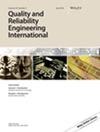简单阶跃应力加速试验的最大熵先验
IF 2.8
3区 工程技术
Q3 ENGINEERING, INDUSTRIAL
引用次数: 0
摘要
阶跃应力程序是一种常用的加速试验,用于分析高可靠性部件的使用寿命。本文研究的是一种简单的阶跃应力加速试验,假定采用累积暴露模型,寿命数据采用未删节的 Weibull 分布。最大似然法通常用于分析加速应力测试数据。另一种方法是使用贝叶斯推断法,这种方法在可用数据有限的情况下非常有用。本文基于客观贝叶斯观点,使用非信息先验估计模型参数。我们的主要目的是提出 Zellner(1984 年)提出的最大数据信息先验(MDIP),作为在参数先验知识很少或没有的情况下,未知参数的传统独立伽马先验的替代先验。我们还根据这两类先验,假设三种不同的损失函数:平方误差损失函数(SELF)、线性-指数损失函数(LINEX)和广义熵损失函数(GELF),得到了贝叶斯估计器。通过蒙特卡洛模拟,我们将提议的 MDIP 先验与伽马先验进行了比较,检验了它们在三种损失函数下的偏差和均方误差以及覆盖概率。此外,我们还采用了马尔可夫链蒙特卡罗(MCMC)算法来提取边际后验分布的特征,如贝叶斯估计值和可信区间。最后,我们展示了一个真实的生命周期数据,以说明所提出的方法。本文章由计算机程序翻译,如有差异,请以英文原文为准。
Maximal entropy prior for the simple step‐stress accelerated test
The step‐stress procedure is a popular accelerated test used to analyze the lifetime of highly reliable components. This paper considers a simple step‐stress accelerated test assuming a cumulative exposure model with uncensored lifetime data following a Weibull distribution. The maximum likelihood approach is often used to analyze accelerated stress test data. Another approach is to use the Bayesian inference, which is useful when there is limited data available. In this paper, the parameters of the model are estimated based on the objective Bayesian viewpoint using non‐informative priors. Our main aim is to propose the maximal data information prior (MDIP) presented by Zellner (1984) as an alternative prior to the conventional independent gamma priors for the unknown parameters, in situations where there is little or no a priori knowledge about the parameters. We also obtain the Bayes estimators based on both classes of priors, assuming three different loss functions: square error loss function (SELF), linear‐exponential loss function (LINEX), and generalized entropy loss function (GELF). The proposed MDIP prior is compared with the gamma priors via Monte Carlo simulations by examining their biases and mean square errors under the three loss functions, and coverage probability. Additionally, we employ the Markov Chain Monte Carlo (MCMC) algorithm to extract characteristics of marginal posterior distributions, such as the Bayes estimator and credible intervals. Finally, a real lifetime data is presented to illustrate the proposed methodology.
求助全文
通过发布文献求助,成功后即可免费获取论文全文。
去求助
来源期刊
CiteScore
4.90
自引率
21.70%
发文量
181
审稿时长
6 months
期刊介绍:
Quality and Reliability Engineering International is a journal devoted to practical engineering aspects of quality and reliability. A refereed technical journal published eight times per year, it covers the development and practical application of existing theoretical methods, research and industrial practices. Articles in the journal will be concerned with case studies, tutorial-type reviews and also with applications of new or well-known theory to the solution of actual quality and reliability problems in engineering.
Papers describing the use of mathematical and statistical tools to solve real life industrial problems are encouraged, provided that the emphasis is placed on practical applications and demonstrated case studies.
The scope of the journal is intended to include components, physics of failure, equipment and systems from the fields of electronic, electrical, mechanical and systems engineering. The areas of communications, aerospace, automotive, railways, shipboard equipment, control engineering and consumer products are all covered by the journal.
Quality and reliability of hardware as well as software are covered. Papers on software engineering and its impact on product quality and reliability are encouraged. The journal will also cover the management of quality and reliability in the engineering industry.
Special issues on a variety of key topics are published every year and contribute to the enhancement of Quality and Reliability Engineering International as a major reference in its field.

 求助内容:
求助内容: 应助结果提醒方式:
应助结果提醒方式:


